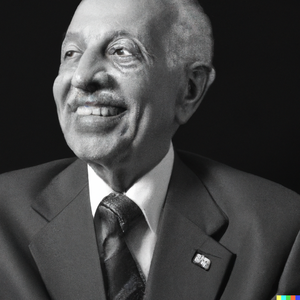Majid Khummam: Difference between revisions
(Created page with "{{Infobox officeholder | honorific_prefix = President | name = ¨Majid Khummam | native_name = ماجد خمام | native_name_lang = ar | honori...") |
No edit summary |
||
| Line 27: | Line 27: | ||
| constituency = | | constituency = | ||
| majority = | | majority = | ||
| predecessor = [[ | | predecessor = [[Mohammed Waladiya]] | ||
| successor = [[Jalil Al Kharrabi]] | | successor = [[Jalil Al Kharrabi]] | ||
| prior_term = | | prior_term = | ||
Revision as of 04:26, 31 December 2022
President ¨Majid Khummam | |
|---|---|
ماجد خمام | |
Majid Khummam during a meeting with Kakish diplomats, February 1977. | |
| President of Salamat | |
| Assumed office April 18th 1975 - May 16th 1977 | |
| Prime Minister | Mohammed Hamis |
| Preceded by | Mohammed Waladiya |
| Succeeded by | Jalil Al Kharrabi |
| Personal details | |
| Born | Majid Khummam November 5, 1905 Bani Dasser, Salamati Trade Dependancy |
| Died | 22 May 1982 (aged 76) Dar Al Hamma, Salamat |
| Cause of death | Cancer |
| Resting place | Martyrs Cemetery, Bab Casbah, Dar Al Hamma |
| Citizenship | Salamat |
| Nationality | |
| Political party | National Salvation Party |
| Height | 164 cm (5 ft 5 in) |
| Spouse(s) | Rumeysa Bint Karim (m.1928-1963) Safiya Awlani (m.1968-1982) |
| Children | Muhammad Khummam (1932-2004) Aisha Khummam (1935-1996) Rahman Khummam (1936-2012) |
| Parents |
|
| Occupation | President of Salamat |
| Cabinet | Cabinet of Majid Khummam |
Majid Khummam (November 5 1905 - May 22 1982) was the 2nd president of Salamat, from 1975 until the coup d'état of Jalil Al Kharrabi in May 1977.
Majid Khummam was one of the only Salamati presidents that didn't have any significant roles in the army or the Salamati Independence War, with Amine Benbahlil, Malik Khayri and Mohammed Jandubi. Khummam is considered as the "great diplomat" of Salamat, forging new relations with other countries. He is also behind the little economic boom of 1976, by increasing exports of natural gas and oil.
After his arrest during the 1977 coup, he was placed in detention in the Narqa Political Camp, and was sentenced to death by the Supreme Court of Salamat on November 25 1981. However, he was battling liver cancer at this time, and he died on May 22 1982 due to complications, before his execution, planned for June 1 1982.
